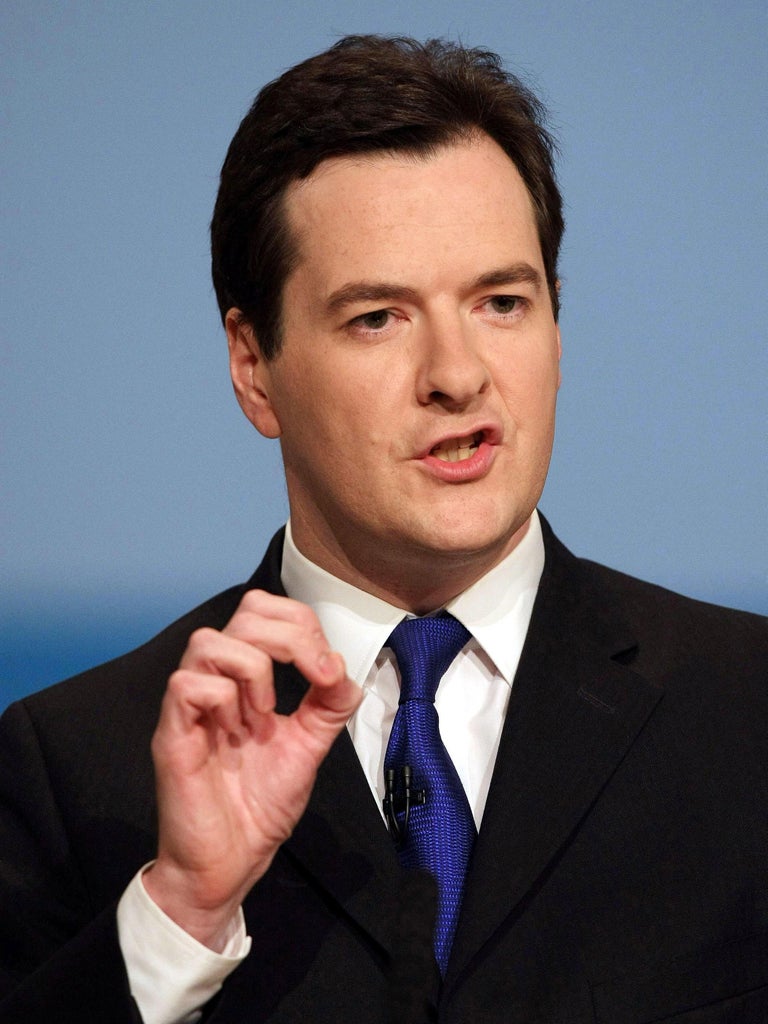Osborne to back bank reforms – but not for eight years
Chancellor pledges to implement Vickers Plan in full in bid to avoid further bailouts

George Osborne will detail plans today for a wide-ranging overhaul of the structure of Britain's major banks, forcing them to split their high street and investment operations.
The aim is to prevent a repeat of the 2008 financial crisis when major banks had to be rescued from collapse by a multibillion-pound bailout from the taxpayer.
The separation – confirmed yesterday by the Business Secretary, Vince Cable – has been resisted by some of the banks which have claimed the shake-up could cost the sector up to £12bn and warned that the bill could eventually be passed on to customers.
There have also been tensions between ministers over whether to press ahead with such wide-ranging reform at a time when the economy is so fragile. However, Mr Osborne will tell MPs today he is implementing the full recommendations of the Independent Commission on Banking, which called for lenders to be forced to create "firewalls" between their retail and investment operations.
The banks will have to put their operations into legally distinct separate arms; exactly what goes into each entity will form the basis of detailed negotiations between ministers, the banks and regulators.
Mr Osborne will also tell the banks that they will have to hold more capital to act as a buffer against future financial emergencies.
Under the Government's plans, the complex legislation underpinning the changes would be passed by 2014-15 and the full separation completed by 2019.
The commission, chaired by Sir John Vickers, was set up to look for ways of making the banking system safer and increasing competition for customers.
Its main proposal was for banks such as Barclays and Royal Bank of Scotland to "ring-fence" retail deposits and business lending from the risky investment operations described by Mr Cable as "casino banking". The idea is also that the state, which guarantees retail deposits, does not indirectly subsidise investment banking. The Treasury is expected to confirm the commission's estimate that the plans could cost banks between £4bn and £7bn, although industry sources put the the cost at £12bn. They have also warned that banks such as HSBC will move their head offices away from the City of London.
Mr Cable told BBC1's Andrew Marr Show yesterday: "Our big banks were at the very centre of the financial crisis ... and it needs reform."
He said: "We can't have a position where the big banks are too big to fail, where there's a taxpayer subsidy, so we're going to deal with that problem."
The Business Secretary added: "It is absolutely right that we make the British economy safe. We just cannot risk a repetition of the financial catastrophe we had three years ago.
"Big structural reform of the banks was something we [the Liberal Democrats] fought for and argued for and now it is going to happen."
Critics will argue that the Chancellor is acting too slowly by delaying separation until 2019, although that was the date suggested in the Vickers report. Chris Leslie, a shadow Treasury spokesman, said: "There must be no foot dragging and no watering down of these reforms. That is why the independent commission should be asked to publish a report in 12 months on what progress has been made in implementing and legislating for these reforms."
But Lord Oakeshott, a former Liberal Democrat Treasury spokesman, said: "The Government's decision to accept the Vickers report and irrevocably break up the banks by 2015 is a triumph for a four-year campaign by Vince Cable and the Liberal Democrats."
Vickers reforms: at a glance
* Banks should ring-fence their high street banking operations to prevent the possibility of contamination by risky "casino" investment arms. The ring-fenced part of the bank should have its own board and should be legally and operationally separate. This reform should be implemented by 2019 at the latest.
* The ring-fenced part of the bank should have a capital cushion of 20 per cent of assets, considerably more than demanded at the moment by international capital adequacy rules.
* In the event of a bank's insolvency, ordinary savers should be paid back before any other creditors.
* Banks should make it easier for customers to switch accounts to their competitors by establishing an industry-wide account redirection service.
Join our commenting forum
Join thought-provoking conversations, follow other Independent readers and see their replies
Comments
Bookmark popover
Removed from bookmarks